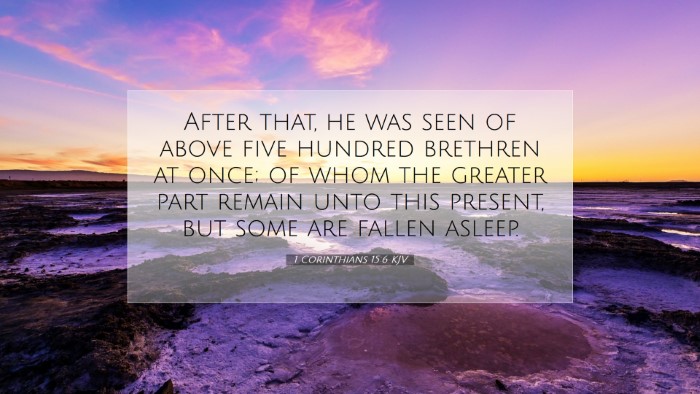Commentary on 1 Corinthians 15:6
Verse: "After that, he was seen of above five hundred brethren at once; of whom the greater part remain unto this present, but some are fallen asleep." (1 Corinthians 15:6)
Introduction
This verse constitutes a vital part of the Apostle Paul’s argument regarding the resurrection of Christ and, by extension, the resurrection of believers. In this passage, Paul asserts the reality of Christ's resurrection by citing the testimony of numerous witnesses, thus establishing a strong foundation for the faith of believers.
Contextual Analysis
The broader context of 1 Corinthians 15 discusses the resurrection, which was a core belief and doctrine in early Christianity. The Apostle Paul addresses doubts and misconceptions that had arisen within the Corinthian church concerning the resurrection of the dead. By providing evidence of Christ's resurrection, he aims to instill confidence and assurance in the resurrection hope of all believers.
Insights from Matthew Henry
Matthew Henry emphasizes the significance of the resurrection in confirming the truth of the Gospel. He notes that the appearance to over five hundred individuals not only demonstrates the reality of the event but also serves to encourage the faithful that their hope in Christ's resurrection is well-founded. Henry comments on the phrase “the greater part remain,” highlighting the authority of the collective witness. The testimony of many serves to reinforce the message of Christ's victory over death.
Insights from Albert Barnes
Albert Barnes elaborates on the implications of Christ being seen by such a large group. He asserts that the sheer number of witnesses decreases the likelihood of conspiracy or deception regarding the resurrection. Barnes points out that many of those who witnessed the resurrected Christ were still alive at the time Paul wrote this epistle, thereby inviting skeptics to inquire and verify the claims themselves. This adds a layer of credibility and historical reality to the resurrection narrative.
Insights from Adam Clarke
Adam Clarke provides a theological reflection on the phrase “some are fallen asleep.” He interprets this as a euphemism for death and highlights a fundamental Christian hope that death is not final but is a transition for believers into eternal life. Clarke encourages readers to see in this verse not just a historical report, but a hopeful proclamation of the Christian doctrine of resurrection that assures believers of an eternal destiny with Christ.
Theological Implications
The implications of 1 Corinthians 15:6 are profound. It contains both apologetic and pastoral elements. First, it serves as an apologetic defense of the resurrection event, crucial for the Christian faith. Second, it pasturally comforts believers who face the reality of mortality and grief, emphasizing that death for a believer is temporary and transitions into everlasting life.
- Evidence of Eyewitnesses: The number of witnesses serves to strengthen the argument for the resurrection's authenticity.
- Challenge to Skepticism: Paul encourages investigation by pointing out that many witnesses were still alive, implying that skeptics could seek them out.
- Hope in Death: “Fallen asleep” provides a hopeful view of death, reinforcing the idea of resurrection as a promise fulfilled.
Application for Believers
For pastors, students, and scholars, this passage bears rich implications for both preaching and teaching. It underscores the necessity of grounding one’s faith in historical facts while also offering a message of comfort.
- Faith Foundation: Acknowledge and teach about the historical evidence and testimonies surrounding the resurrection.
- Consolation in Grief: Use this passage to provide hope to those mourning, reminding them of the eternal promise of life with Christ.
- Encouragement for Witnessing: Like Paul, believers are called to share their faith with confidence, relying on the truth of Christ’s resurrection.
Conclusion
1 Corinthians 15:6 stands as a critical affirmation of the Christian faith. The multitude of witnesses underscores the authenticity of Christ's resurrection, providing both apologetic strength and pastoral comfort. As Christians reflect on this verse, may they be encouraged not only in their belief but also in their call to share the good news of the resurrection with the world.


